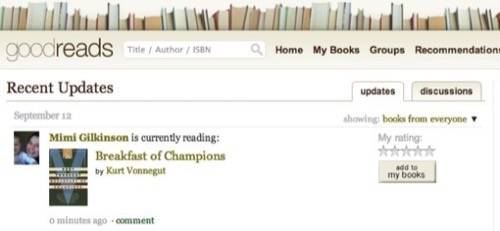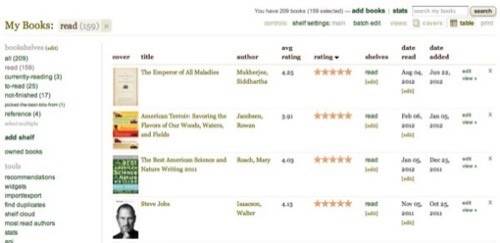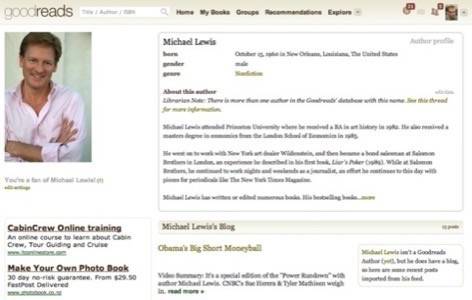
My next series of posts is entitled Social Books. Over five posts, I’m going to explore how book readers and writers use social networking tools. Three of the posts will be from the point of view of readers, starting with this one today about the leading social network for bookworms: Goodreads. In the remaining posts, I’ll be checking out a brand new social network for writers and investigating how book publishers are using social media. So let’s get started with far and away the most popular social network for book lovers in the world, Goodreads. Its user base has almost doubled in 2012, which made me wonder whether Goodreads has any real competition now…
Goodreads was launched in January 2007 and currently has over 10 million registered users, who have collectively added 370 million books to the site. Goodreads has experienced strong growth over the past 18 months. It had 5 million registered users in May 2011, increasing to 6 million by December. In 2012 the growth of Goodreads went up another level, thanks mainly to its integration with Facebook Timeline in January.
Goodreads: Onto A Good Thing
In Goodreads you’re encouraged to add books into custom shelves (a.k.a. lists), such as “Currently Reading,” “Read,” and “To Read.” That way, anybody you have connected to can see what you’re reading or intend to read – and vice versa. Goodreads also has all the other common features of a social network: discussions, ratings, reviews, messaging.

Goodreads also has groups galore. Founder and CEO Otis Chandler told ReadWriteWeb in April that “we have 20,000 groups on our site, such as The Sword and Laser (part of the new Geek & Sundry YouTube channel), The Next Best Book Club and small, private, meet-in-real-life groups like the Boston Book Club.”
The foundation of Goodreads is providing social recommendations. As Chandler wrote, when explaining why he built Goodreads, “when I want to know what books to read, I’d rather turn to a friend than any random person or bestseller list.” That core functionality got a huge boost from the Facebook integration in January. After all, the more friends you can connect to on Goodreads, the more books you’ll discover.
One interesting thing to watch is Goodreads’ partnerships with publishing houses and authors. Chandler wrote on Quora last year that “we work with all major book publishers and many mid-majors to help them launch their books to our audience of book readers.” It also helps self-publishers promote their books.
Even authors who aren’t officially connected to Goodreads have their own profile on the site. For example, I’m a fan of Michael Lewis on Goodreads – his page features biographical information, book links, blog posts (from his Blogspot site), video and more.

Are There Good Alternatives To Goodreads?
Goodreads competes with LibraryThing and Shelfari. Both are far behind Goodreads in number of users, however Shelfari remains a threat because of its owner: Amazon. Indeed, as Goodreads has grown, its reliance on Amazon’s product advertising API for book information became untenable. That’s why in January of this year, Goodreads announced that Ingram, the largest wholesaler of books in the U.S., was its new primary data partner.
Whatever qualities LibraryThing and Shelfari have – and both have a better design than Goodreads – it’s hard to go past Goodreads, due to its large user base and excellent Facebook integration. When it comes to getting social recommendations for books, those are the two key factors.
The two biggest threats to Goodreads now are: 1) if Facebook decides to do book reviews itself; and 2) if Amazon gets its act together and starts pushing Shelfari (or Kindle Profiles, its own semi-serious social experiment). However I think the chances of either Facebook or Amazon ruining Goodreads’ good thing is slim, at least in the short term. Facebook is better off supporting and partnering with Goodreads, as it does with other specialist networks (like Spotify). Meanwhile Amazon is too busy trying to control the e-reader and book retail markets, so Shelfari will probably continue being largely ignored by Bezos and crew.
2012 has been a good great year for Goodreads. If you’re a bookworm like me, I recommend you check it out – and friend me there!
















